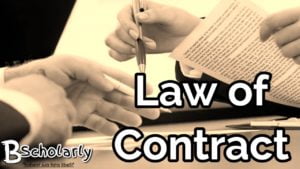Fact, Issues and Decision of the court in Spencer v Harding: Any contract that can be enforceable in court has to pass through various elements amongst which are the fact that there must be an offer from the offeror which should be accepted by the offeree who then furnishes consideration for the offer and the parties must have an intention to create legal relationship. Offer is one of the most important elements in contract which must be expressly made to a particular person.

The courts have accepted that in some instances, some acts of the offeror which although appear to be an offer are actually not offer. One of such circumstances called “request for tenders” which falls under one of the various types of “invitation to treat“. An invitation to treat is something that is done before an offer is made which falls short of being called an offer. It is not final, neither is it definite. A quite number of instances can qualify as invitation to treat; Advertisements placed in catalogues or price tags attached to items in supermarkets, invitation to a job interview, announcement of a participation in a scholarship exams etc are all examples of invitation to treat.
Recommended: How to become a successful lawyer
The essence of distinguishing offer from invitation to treat is that if what is made is an invitation to treat, then no offer has been said to be made and the other party is not bound. But if it was found that what was made is a true offer, then the offeree who accepts the offer is bound by the terms of the contract and cannot go back.
The court in Spencer v Harding was greeted with one of those circumstances where it will be rightly said that there is no offer but an invitation to treat.
Also see: Exceptions to hearsay evidence in law
Facts of Spencer v Harding
The defendants, Harding had put out circulars in form of advertisements inviting the public to buy stocks from a company. The plaintiff complied with thr requirements diligently. He approached the defendants to enforce the offer since they made the highest bidder but the defendants refused to accept thier tender. Aggrieved, the plaintiff approached the court of common pleas.
Must read: Major rules of interpretation in Law explained
Issue raised
The issue raised by this case is whether a request for tenders amounts to an offer Capable of being accepted?
Judgment of the court in Spencer v Harding
In the words of Wiles J, the request is simply an attempt to ascertain whether an offer can be obtained within such a margin which will now be accepted by the sellers. In essence. By making the tender, the buyer makes an offer that which will be now accepted by the sellers.
So it cannot be said that the sellers is making the offer by merely sending out circulars requesting for tenders. It follows therefore that the person who makes the offer is the buyer which will be now accepted by the sellers to now form a valid contract. It is more like an offer to bargain, Moreover, the plaintiff has not even established that the defendant promised to sell to the highest bidder so that they(the defendants) will be bound if they go against thier promise.
Recommended: Essentials of a binding contract in law
It is merely an initiation of negotiations, there are possibilities that the agreement may crystallize into an offer or it may not. Saying therefore that invitation to treat is an offer will lead to absurd situations where a person will be bound wherenever there is a highest bidder who he can no longer choose not to contract with. That will surely effect the efficacy of business transactions and lead to illogical conclusions.

ALSO SEE: Smith v Selwyn: Facts, Issues and Judgment of court
Similar position has been followed in Nigeria. In the 1990 case of Innih v Ferado, an advertisement has been placed and addressed at the public at large inviting tenders for the purchase of assets of the Nigerian Palm Produce Board. It was held that the fact that an offer was tendered by the members of the public is not itself an offer.
This is simply an invitation to negotiate the selling of assets. The company cannot by making such advertisement be bound by the tender accepted by one of the members of the public.
Hope this case summary was helpful? In order to further your understanding of this principle of law, I recommend you check out my article on the differences between Offer and invitation to treat here.

Edeh Samuel Chukwuemeka, ACMC, is a lawyer and a certified mediator/conciliator in Nigeria. He is also a developer with knowledge in various programming languages. Samuel is determined to leverage his skills in technology, SEO, and legal practice to revolutionize the legal profession worldwide by creating web and mobile applications that simplify legal research. Sam is also passionate about educating and providing valuable information to people.